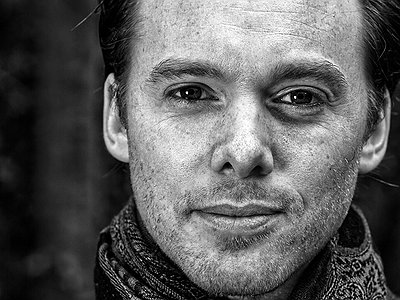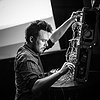There are many descriptions of the ideal state of mind for being creative. What is it like for you? What supports this ideal state of mind and what are distractions? Are there strategies to enter into this state more easily?
The internet and smart phones are my nemesis, they destroy creativity. I find even minor and infrequent interruptions difficult to bare, the idea of something that can constantly find new ways to grab my attention is terrifying. Thankfully, I live in a basement without signal, so attempt to not use these sort of things as often as possible (though they just as often defeat my will). Disruptive technologies aside, I need to be tidy – to have everything set up before me, and to have fully explored the space within which I am working. My studio is always arranged before I compose, and everything is plugged in and on, ready to try new ideas without distraction. When playing live, I like to arrive at shows hours early and likewise explore the space – I try to arrive at the venue as soon as it is open, or even the day before, and walk around, touch the walls, test its resonance. This may seem pretentious, but it is an integral part of knowing the space with which I will be working. Socially, I am incredibly nervous in new places, so this helps me focus on the work at hand.
How is playing live and writing music in the studio connected? What do you achieve and draw from each experience personally? How do you see the relationship between improvisation and composition in this regard?
I have never understood the difference between composition and improvisation in any meaningful sense. I am always improvising, in so far as the situation and conditions are always changing. Even though I write down the music I perform, these instructions are reliant on my senses in the moment of performance, the mood through which I interpret them. That said, the studio environment often allows for a more pronounced sense of repetition, both through the act of recording ideas and the limitation of external pressures.
On the other hand, I find that live performances help me to clarify ideas worked on in the studio – I find the studio to lack the depth of a live social situation, and am concerned about just ‘playing with toys’ rather than actually exploring and engaging with ideas of importance.
How do you see the relationship between the 'sound' aspects of music and the 'composition' aspects? How do you work with sound and timbre to meet certain production ideas and in which way can certain sounds already take on compositional qualities?
Composition interests me because it is dialogic in nature - an artist is not responsible for composition, but for making stimuli available in such a way that its audience might be able to compose with it. When I ‘compose’ music, I am really just arranging sounds in a manner that suggests possible relationships within the materials used. I like to work with sounds that resonate with me, whether produced by instruments or objects, and to explore their proximity to other aspects of their ecology. I began by working much more heavily with field-recording, due to the more literal ecological relationships inherent to that form. However, the huge advantage of my later forays into synthesis, is that I can spend prolonged periods of time exploring extremely subtle changes of timbre. This is increasingly important, as it serves as a resistance to the relentlessly shallow and short-sighted nature of much of modern experience. The internet - our cultural medium of choice - actively prioritises a surface level reading of the artefacts it provides, much as the current economic system prioritises arbitrary and regular temporal divisions (between, for instance, work and leisure). The affordance of composition is that it can, often though the careful evolution of timbre and rhythm, re-present individual sounds as abstracted moments borrowed from the broader soundscape of life. For this reason, I often prefer art that cannot be well-rendered on small screens and crap speakers without losing its integrity entirely. All of my best work fails completely to be captured by the limited architecture of the internet.
Our sense of hearing shares intriguing connections to other senses. From your experience, what are some of the most inspiring overlaps between different senses - and what do they tell us about the way our senses work? What happens to sound at its outermost borders?
I work with video a lot, due to just such an overlap. However, my real interest is not the overlap between individual senses, but the holistic experience that encapsulates all senses equally, including spiritual senses. I consider myself an immersive composer for this reason. I do not work with ‘immersive’ technologies (I am not convinced such a distinction really exists - I struggle to think of any experience I have had that wasn’t, for better or worse, immersive), but seek to compose for the experience of presence – the overarching phenomenon of being in time and in space, of which sound contributes just a part. In particular, I am a big proponent of boredom. Nothing enlivens the senses such as stimuli that actively seeks to override the dominance of any one sense, to place the perceiver in a compromised state where they can no longer prioritise a single way of being in the world. The special quality of music is that it highlights just this effect - harmony and rhythm can quite literally emerge from prolonged exposure to sound, once any pre-emptive hope of understanding is lost.
Art can be a purpose in its own right, but it can also directly feed back into everyday life, take on a social and political role and lead to more engagement. Can you describe your approach to art and being an artist?
I consider art to be a tool of social, ecological and spiritual engagement, whist the ‘artist’ is the functionary who makes such a tool more readily available to others. I cannot imagine an artwork that doesn’t have an inherent social or political role - history has taught us that silence, or in-action, often result in a profound social outcome. As such, all artwork is by default socially-engaged, everything is political, for everything, in one way or another, deals with change. The temporal arts in particular highlight this well, since they work by exposing their audience to new perspectives over time, with full knowledge that their social context is always in flux. That is not to say that the idea of ‘political’ art is not problematic – as Jaques Ranciere suggested, art functions because it is inexplicit, it is abstract, and vague, and cannot be reduced to a single political objective. Art that seeks to be political – rather than simply acknowledging its own political power – risks not being art at all.
It is remarkable, in a way, that we have arrived in the 21st century with the basic concept of music still intact. Do you have a vision of music, an idea of what music could be beyond its current form?
I am not convinced that the basic concept of music is intact. It has been fractured into a music industry - based around craft - and music composition, which has become broadly what is called ‘sound-art’. This is not to denigrate the music industry – contemporary pop ‘music’, for instance, could only exist as an outcome of the market’s relationship to fashion, post-modernism, and so forth, and is often a fascinating endeavour. I am not convinced, however, that this is truly music in a compositional sense. Composition is more than an exploration or arrangement of form, and is reactive to the nuance of its environment in a way that the music industry cannot achieve. One of my great bugbears is that we so often promote the idea of comprehending art – when art is, or should be, something that is beyond comprehension. I consider art to exist somewhere in the act of striving for sense - it is precisely because we don’t immediately comprehend the ‘truth’ of a matter, that we attempt to compose the materials we face in the hope of finding something recognisable. Unfortunately, I fear this approach is out of step with both the music industry and the preferred mediums by which it is disseminated. My hope is that, once we lose our current infatuation with the Internet, we entertain a cultural kickback wherein confusion, boredom, and difficulty are considered integral stages to the process of composition - an act now not resting on the shoulders of the artist, but on those of the audience.



